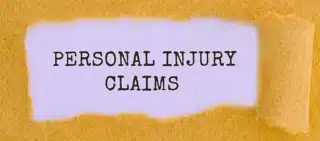
When a Dog Attacks Again and Again If dogs attack once, it’s alarming. When they attack five times, it’s no...


Whether your Bloomington personal injury case goes to trial will depend on the steps taken in the claim process. If you are successful in reaching a settlement with the other party and recovering a satisfactory compensation amount, your case will not need to proceed to trial. However, if the other party is resistant to negotiations, or the insurance company fails to offer a fair settlement, your financial recovery may only take place through a lawsuit.
Knowing if you can expect your personal injury case to go to trial is important when planning for your case. It can be beneficial to see how many personal injury cases go to trial, why a personal injury case should go to trial, and how to prepare for trial.
Personal injury cases do not usually go to court, as most of these claims are resolved through negotiations and settlements. A personal injury case should go to trial if there is a dispute that cannot be easily resolved between the two parties during the claim process. Preparing for trial may require finding a personal injury attorney, contacting the defendant who you believe is responsible for your injury, examining your injuries, collecting evidence and testimonies from experts and witnesses, and attempting to resolve the case through settlement negotiations.

A personal injury case is a legal claim made by a person who was harmed or injured as a result of the actions or decisions of others. Personal harm or injuries can include bodily injury from falling or slipping, automobile accidents, products that were defective or contained harmful chemicals or other substances, faulty construction of a building, and medical malpractice. People who have been injured in these cases typically file a lawsuit against the person they believe is responsible for their harm.
These lawsuits seek to recover financial compensation for the injured person to reimburse him or her for various expenses or damages. Some examples of damages in a personal injury claim include medical expenses for treating injuries and hospital stays, lost wages due to the inability to work because of the injuries, feelings of pain and suffering, and permanent disability reimbursement resulting from the impact of the harm. The amount you can recover in compensation can vary, but it is mostly determined based on the total costs stemming from your injuries.
The steps in a personal injury lawsuit can vary depending on certain factors, like the severity of your injuries or whether witness statements and expert opinions are required. The personal injury claim process can be long and complicated, and it can end with a trial verdict in the absence of a successful settlement negotiation. If you are an injured person and suffered harm as a result of someone else's actions, a lawsuit may help you recover compensation for your harm. You will simply have to show that the person you are suing was responsible for causing your injuries.
There are pre-settlement and pre-trial phases of a lawsuit that may work differently for parties in the personal injury claim process.
The claim process can begin with identifying the person that is responsible for causing your injuries and their insurers. This person could be another driver if your injuries came from an automobile accident, or landlords and building administrators if your injuries came from unsafe building environments. A personal injury lawyer can review your case to figure out who the responsible party is.
Some personal injury lawyers may choose to reach out to the responsible party's insurers, rather than to the responsible parties directly. During this time, the injured party can assess his or her injuries and collect evidence that documents the injuries, the accident, and the treatment or hospital stays. For evidence purposes, victims should document what the treatment procedures were and how long recovery took. Treatment of injuries and medical recovery periods may vary depending on the nature of the injuries. Depending on the severity of the injuries, the length of treatment time, and the recovery process, it may be important to know how long you have to sue for a personal injury claim. In Bloomington, injured people have around two years to initiate a claim against those responsible for their injuries.
The next step in the process is to submit a demand for compensation to the responsible party or his or her insurers. The demand usually takes the form of a written document that is sent to the responsible party or his or her insurance company by the lawyer representing the victim. Demands will state the facts surrounding the accident that led to the injuries and the amount of compensation the injured party requests. The demand will set the stage for settlement negotiations, where both parties will find ways to resolve the dispute and agree on an amount of damages that the responsible party or his or her insurance company will pay.
There is a possibility that the parties may not find an agreement on their dispute. The injured party may not be getting a compensation offer that is sufficient to cover the true costs of his or her injuries. If this occurs, the personal injury claim will proceed to trial.
Most personal injury cases do not reach the point of going to trial. These cases are usually resolved through settlement negotiations, and the injured person would recover compensation based on what was agreed upon between the two parties when they negotiated and settled. A personal injury settlement is a finalized, negotiated legal agreement intended to end a dispute between two parties. This represents an agreed upon amount of compensation the injured party can recover from the party responsible for his or her injuries.
Understanding the likelihood of a personal injury case going to trial may give you an idea of how long the claim process can be and your chances of recovering compensation for your injuries. There are many reasons parties in personal injury cases choose to reach a settlement rather than putting their trust in a trial verdict to recover compensation.
The U.S. Department of Justice estimates that less than 5% of personal injury claims will end up in trial, since the majority of these cases successfully reach a negotiated settlement. Plaintiffs who end up going to trial reach successful verdicts around 50% of the time, according to a study conducted by the Bureau of Justice Statistics. The same study found that severe injuries can make your personal injury case go to trial and reach a successful verdict most of the time.
Knowing how to prepare for trial can help ease the stress of a personal injury lawsuit. The lawsuit process takes place in several phases. These phases of the lawsuit include collecting evidence, documenting witness statements, and reaching out to experts to review the injuries and give their professional opinions. These phases in the personal injury claim process can operate differently depending on the circumstances of your accident.
Once the settlement negotiations stage has been unsuccessful, the lawyer representing you can file your case on your behalf to move the case to trial. The next phases in the personal injury lawsuit leading up to trial include:
Witness statements can be supportive in verifying significant facts in the injured person's account of what happened. They may help to establish liability of the other party for causing the accident. Witness statements may be used as evidence to support the extent of damages that the injured party experienced. A statement can be used at the trial if a witness is unable to come.
Expert testimony can be used to establish the liability of the person who caused your injuries. Experts are known to have high credibility within their respective fields, and their opinion can help your case at trial.
Preparing for trial in a personal injury lawsuit may require all or some of these phases. There are certain factors that could alter the claim process prior to settlement negotiations and leading up to trial. If you are an injured plaintiff seeking to recover an amount of money to compensate for your injuries, settlement negotiations do not have to be your only option.
Settlement negotiations can be unsuccessful because of an unwillingness of the parties to resolve aspects of the dispute. Adequately preparing for trial will be your next option to increase your chances of winning a verdict and recovering fair compensation.
Like with any civil case, the costs of participating in all the phases of a lawsuit and preparing for trial can be tedious. The litigation expenses that come with the personal injury case process can be a burden on some people in personal injury cases. It can be tempting for an injured plaintiff to negotiate and settle with the other party, usually recovering for a lower compensation amount, rather than to go to trial and risk losing the case entirely.
Not winning a verdict may mean not recovering any compensation at all. If you as an injured plaintiff were to settle, you will recover some compensation. The same cannot be said about a trial verdict, where your chances of compensation recovery are about 50%. There may be incentives for some parties to settle and avoid the trial process, and there are reasons some parties decide to go to trial to resolve their disputes and recover higher compensation.
If the dispute has not been resolved and settlement negotiations are unsuccessful, your case should go to trial so that you may recover compensation. Additionally, cases involving catastrophic or severe injuries should go to trial, as initial settlement offers are unlikely to cover the true costs of the victim’s injuries. Getting a grasp on why a personal injury case should go to trial can provide a roadmap of expectations if you’re an injured person seeking to recover compensation.
A Bloomington personal injury attorney can review your case to help you determine whether your claim should proceed to trial. If your case does proceed to trial, he or she can help you build a strong case to present to the court.

When a Dog Attacks Again and Again If dogs attack once, it’s alarming. When they attack five times, it’s no...

Overview of the Personal Injury Claim Process in Illinois No one expects to suffer an injury or get involved in...

Exploring Caps on Damages in Illinois Personal Injury Cases Illinois does not have laws capping damages in successful personal injury...